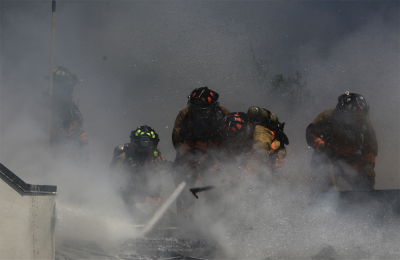Author: IAFF Staff
August 31, 2018
Guilt is something all people experience and feel. For example, fire fighters can sometimes feel guilty if they are seconds too late to the scene of an accident, have trouble with equipment, or simply think that they didn’t do enough to save someone.
A guilty conscience can be a fire fighter’s personal Alcatraz — a rocky, labyrinthine prison that’s impossible to escape. If you feel responsible for a negative or fatal outcome on a call, you may punish yourself with thoughts that you could have done something differently or even think you are a bad person for living when someone else did not.
Survivor’s guilt can be one of the worst challenges a fire fighter faces. Learning to let go of these feelings and practice self-compassion can be one of the most important life skills for a fire fighter to foster.
Clinical psychologist Dr. Ali Mattu, Ph.D. notes that “Guilt can become a problem if it is keeping you from living your life. Too much guilt can cloud your thoughts, lead you to feel significant distress and make it hard to go through your daily activities.”
So how can you let go of the harmful guilt you may be experiencing? There are five crucial tips to consider:
- Understand It – Dr. Mattu suggests that before you can let go of your guilt, you must understand it. To do this, you must face your guilt and examine the rationale for your beliefs. Sometimes, there are unhelpful or faulty belief systems in place, which can serve to perpetuate guilty feelings such as, “I should be able to save everyone, every time.”
- Talk it out – When you’re constantly replaying incidents and traumatic calls in your mind, you might get stuck ruminating on what happened — or what didn’t. That’s why talking to someone who is trustworthy can be helpful, regardless of whether it’s a spouse, a friend, or a fellow fire fighter. There are even support groups specifically for fire fighters. It could be more helpful to talk to someone who knows what you’re going through and is dealing with the same feelings. Another fire fighter can provide you with a more objective perspective on what occurred.
- Find compassion for yourself – Once you have different perspectives from friends, family, and co-workers, it can become easier to find compassion for yourself. This means incorporating the context of what was happening in your life during the situation that caused you to feel guilt. You may still wish you could change what you did or didn’t do during a call, but now you can understand why you reacted the way you did and, therefore, make it easier to come to terms with. This can also help you recognize how you can change.
- Make amends – If you’re still struggling with guilt, it could be time to make amends. This may involve sharing the guilt you are experiencing and discussing what you can do in the future to make similar situations better.
- Talk to a professional – If you still find it difficult to let go of feelings of guilt, even after understanding your past actions and perhaps even apologizing for them, Dr. Mattu suggests talking with a mental health professional. There are also support group organizations in many cities that are just for fire fighters dealing with the stresses and traumas of the job.

If you experience extreme guilt or feelings that could be associated with PTSD or other mental health disorders, it is important to seek help. You don’t have to manage PTSD alone. Remember, there is no shame in seeking treatment for a mental health disorder. Call the IAFF Center of Excellence to learn more about treatment options and support. Telephones are staffed around the clock with professionals who understand and can help.
